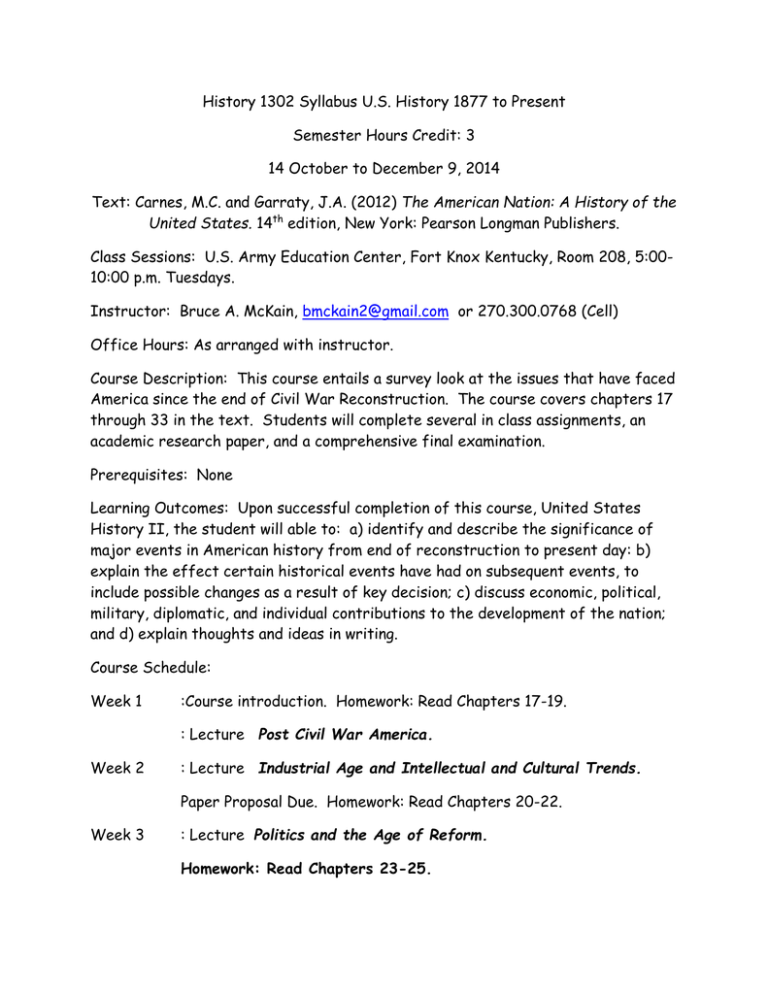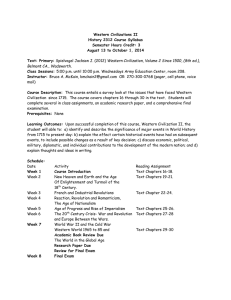
History 1302 Syllabus U.S. History 1877 to Present
Semester Hours Credit: 3
14 October to December 9, 2014
Text: Carnes, M.C. and Garraty, J.A. (2012) The American Nation: A History of the
United States. 14th edition, New York: Pearson Longman Publishers.
Class Sessions: U.S. Army Education Center, Fort Knox Kentucky, Room 208, 5:0010:00 p.m. Tuesdays.
Instructor: Bruce A. McKain, bmckain2@gmail.com or 270.300.0768 (Cell)
Office Hours: As arranged with instructor.
Course Description: This course entails a survey look at the issues that have faced
America since the end of Civil War Reconstruction. The course covers chapters 17
through 33 in the text. Students will complete several in class assignments, an
academic research paper, and a comprehensive final examination.
Prerequisites: None
Learning Outcomes: Upon successful completion of this course, United States
History II, the student will able to: a) identify and describe the significance of
major events in American history from end of reconstruction to present day: b)
explain the effect certain historical events have had on subsequent events, to
include possible changes as a result of key decision; c) discuss economic, political,
military, diplomatic, and individual contributions to the development of the nation;
and d) explain thoughts and ideas in writing.
Course Schedule:
Week 1
:Course introduction. Homework: Read Chapters 17-19.
: Lecture Post Civil War America.
Week 2
: Lecture Industrial Age and Intellectual and Cultural Trends.
Paper Proposal Due. Homework: Read Chapters 20-22.
Week 3
: Lecture Politics and the Age of Reform.
Homework: Read Chapters 23-25.
Week 4
: Lecture Isolation to Empire, The Great War and Post War
Society.
Homework: Read Chapters 26-28.
Week 5
: Lecture New Era, New Deal, War and Peace.
Homework: Read Chapters 29-31. DRAFT RESEARCH PAPER DUE.
Week 6
: Lecture Society in Flux – The Modern U.S. Book Reviews Due.
Homework Read Chapters 32-33.
Week 7
:Lecture Wrap-up. RESEARCH PAPERS DUE. REVIEW FOR FINAL
EXAM.
Week 8
: FINAL EXAM. Chapters 17-33, and all Lectures.
Assignment Description: Late work will be penalized!!
All portions of the course must be completed to receive a passing grade. Failure to
complete any portion of the coursework will result in either an incomplete, or
course failure, with that decision resting with the instructor.
Weekly Quizzes: 25% of course. Quizzes will assess student comprehension of all
coursework to that point. Quizzes will not be made up unless the reason, for
missing the quiz, falls within the college definition of excused absence.
Final Exam: 25% of the course. The Final Exam will be a comprehensive exam of all
Research Paper: 15% of the course. Students will complete an original research
paper, on a U.S. History Topic, 1877 to present. Papers will be 8-10 pages in length
(student writing/body of the paper). The paper topic must be approved by the
instructor. Final papers must be word processed and will be submitted via e-mail, or
on a CD in a Microsoft Word compatible format. Papers will contain all of the
following: Cover Page, Comment Page, Abstract, a minimum of 8 pages of student
produced text, Footnote or Endnotes, and a complete Bibliography. Papers should
be written in MLA format.
Analytic Book Review: 10% of the course. Students will read and submit a nonfiction book review on a topic falling within the confines of the course. Book
review will contain, at a minimum, Title, Author, Author Biographical data, Other
works by same author, restatement of author thesis, analysis of author’s success
or lack of success in achieving his/her goals, student’s opinion of book and author’s
final product.
Class Participation: 25%. Participation and attendance are closely monitored. The
points for each night will be awarded for your presence and active involvement in
the class.
Failure to adhere to the above guidelines will result in a significant penalty.
All draft papers will be submitted in hardcopy. The drafts will be returned to
the student one week after it is submitted. The draft paper must be
returned to the instructor on Week 7.
Grading:
90-100
80-89
70-79
60-69
Below 60
A
B
C
D
F
Grades will be submitted to the CTC Office within five working
days after the end of the course. CTC Site Personnel will input
the grades and they will be available after that time, on the
CTC Website.
Incompletes: Any coursework not completed and turned in by the date grades are
due will result in a reported grade of F. Once coursework is completed, if late
work has been approved by the instructor, then a grade change will be submitted
to reflect the final grade. This will be done on a case by case basis and is not to be
considered as permission to submit late course work.
Scholastic Honesty: All incidents of cheating, collusion, or plagiarism will be dealt
with IAW CTC School policy.
Course Withdrawal: You must withdraw from a course by the published withdrawal
date. Withdrawal policy and procedures are controlled by E-ArmyU.
ADA Compliance: CTC Policy and the instructor’s personal educational philosophy
both require accommodations for students with identified disabilities that affect
their access to their educational program. Any student with an identified
disability should see the instructor individually as soon as possible to insure that
their needs are identified and met.
Research Paper RUBRIC: The research paper will be evaluated using the following
score sheet:
Area
Points Possible
Points Earned
Appropriate Topic
5
__________
Accuracy of Facts
10
__________
Use of Sources
10
__________
Paper Length
10
__________
Timeliness
10
__________
All Required Parts
10
__________
Format
20
__________
Grammar and Construction
20
__________
5
__________
100
__________
Focus of Paper
Total
Attachments:
T- Notes – 1 page
Paper Example – 3 pages
Class Dates List
Subject: _____________________ Date: _____________
TOPIC
NOTES
Paper Example
-----------------------------------------------------New Page------------------------------------------------(Title Page)
(Center Top to Bottom)
Paper Title
Course Title
Date
Student’s Name
Instructor
------------------------------------------------------New Page-----------------------------------------------(1" Margins on all pages, top, bottom, and sides)
Comment Page
(Blank)
----------------------------------------------------New Page-------------------------------------------------Running Head 1
Abstract
The Abstract is a one page synopsis of your paper. It should be written in a narrative format, not
an outline. The Abstract should include the following: Thesis, major ideas you will be exploring, and any
specific references that you found extremely helpful.
---------------------------------------------------New Page--------------------------------------------------Running Head 2
Start your paper on this page. Paper length starts and ends with this section of the paper.
Footnotes will appear at the bottom of the page where the cited material appears.1
Endnotes - if you prefer - will appear in the next section. Each note is numbered sequentially from
number 1 through the end of the paper.
1
This is the insertion point for the first footnote. If more than one note appears on any page it will start
on the next line. Foot notes are numbered from 1 sequentially through the end of the paper.
---------------------------------------------------New Page--------------------------------------------------Running Head 3 - ?
Text continues throughout the end of the paper. Page count ends with this section.
---------------------------------------------------New Page--------------------------------------------------Running Head ?
End Notes
1
This is the point for the first endnote. All Endnotes will appear on this page, with continuation pages
used as needed. Number the pages, however this is not part of your page count. All endnotes are
numbered in the order they appear in the paper. Notes are single spaced with a return between each
note.
2
The second note starts here.
-------------------------------------------------New Page-----------------------------------------------------
Running Head ?
Bibliography
All references used to write the paper, whether cited or not, appear in the Bibliography. List
alphabetically by the author’s last name. Citations are single spaced, with a return between each
citation.
---------------------------------------------------End of Paper------------------------------------------------
Examples of Footnote/Endnote Citation
1
Able A. Smith , History of the Indian Wars (Princeton, N.J. : Princeton University Press, 1990) ,
p. 44. (This is a note for a book)
2
Ibid., p. 46. (Ibid. Indicates use of same source as note just preceding)
3
Thomas A. Jones and Gary B. Nash , Native American Wars (Princeton, N.J. : Princeton
University Press, 1990) , p. 44.
4
Able A. Smith , p. 48. (Would denote subsequent uses of Smith’s Book if other Smiths are
included in the Bibliography. If no other Smiths appear use only the last name.
5
“Indian War Revisited,” Palo Alto Times, 12 January 1885, sec. 4, p. E11. (Note for a
newspaper- with a titled article)
6
Willie Smedlapp , “Indian Cultural Facts,” Smithsonian, September 1968, pp. 44-53. (This is a
note for a magazine article)
7
Thomas K. Smith , Indian Warfare of the West, [Online Document] (Available at)
http:www.native americans/ warfare/west.org. (This is an example of a note for electronic documents.)
Examples of Bibliography Citation
“Indian War Revisited,” Palo Alto Times, 12 January 1885, sec. 4, p. E11. (Note for a newspaper- with a
titled article)
Jones, Thomas A., and Nash, Gary B. , Native American Wars Princeton, N.J. : Princeton University
Press, 1990. (Bibliography cite for book w/ two authors)
Smedlapp, Willie. “Indian Cultural Facts,” Smithsonian, September 1968. (This is a bibliography citation
for a magazine article)
Smith, Able A. History of the Indian Wars. Princeton, N.J. : Princeton University Press, 1990. (This is a
bibliography entry for a book)
Smith, Thomas K. , Indian Warfare of the West, [Online Document] (Available at) http:www. Native
Americans/ warfare/west.org. (This is an example of a bibliography entry for electronic documents.)
Class Dates
Week 1 – October 14, 2014
Week 2 – October 21, 2014 Research Paper Topic Due
Week 3 – October 28, 2014
Week 4 – November 4, 2014
No Class November 11 – Federal Holiday Veteran’s Day.
Week 5 – November 18, 2014 Draft Research Paper Deadline
Week 6 – November 25, 2014 Analytical Book Review Due
Week 7 – December 2, 2014 Research Paper Due
Week 8 – December 9, 2014. Final Exam
Paper Improvement Suggestions
Always keep a back-up copy of your work on an alternate media.
PROOFREAD, PROOFREAD, PROOFREAD, or be penalized.
Ask a classmate or friend to read and criticize your paper. Catch typos and expression problems before turning in your
paper.
Watch verb tense.
Provide full name and identification when referring to a person for the first time.
Identify the author of all quotes (e.g., “As presidential candidate Bubba Blowhard once explained. . .”).
Always avoid “this” without a reference word. (“This was a problem.” What was?)
Like dude, always avoid slang, eh?
Don’t use no double negatives.
Never use contractions in formal writing.
Avoid clichés like the plague.
Eschew obfuscatory morphemes. (avoid jargon)
Do not rely on the words “very” or “extremely.”
Use single quote marks only when quoting within a quotation.
Periods (.) and Commas (,) always go inside quotation marks. Colons ( and Semicolons (;) always go outside quotation marks.
Direct quotes are always footnoted or endnoted. You should also learn to footnote or endnote more than just direct quotes.
Ideas must be developed in structured paragraphs. A single sentence is not a paragraph. A topic sentence should provide a
transition between the rest of the paper and the particular paragraph, as well as introduce the subject to be discussed next.
One or more sentences should provide the evidence and argument necessary to establish the concluding point of the
paragraph, which should be stated in the last sentence.
Students must write exactly what they mean, since papers will be graded on what is written when the paper is submitted
rather than on what the student subsequently explains was “really meant.”
Avoid passive voice. Note: Passive voice is when the subject of the sentence is not performing the action described in the
sentence. Thus “A warning was sent to the British” (passive voice, who sent it?) is less informative than “George Washington
warned the British government” (active voice).
Consult a good style manual, such as Kate Turabian’s A Manual for Writers for correct form guides.


